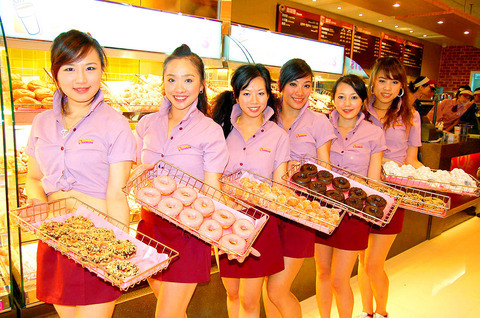Dunkin' Donuts, the 10th-biggest US chain, will open its first store in Taiwan today, providing a wide variety of donuts, beverages and sandwiches to compete head-on with its Japanese counterpart Mister Donut.
Relying on its local partner Mercuries and Associates Ltd's (
The US firm runs over 1,400 Dunkin' Donuts in Asia, including 500 in the Philippines, 400 in Korea, 250 in Indonesia and close to 200 in Thailand. It expressed optimism that the famous brand will soon have a strong presence in the local market.

PHOTO: YANG YA-MIN, TAIPEI TIMES
"Taiwan is a great target market for our Greater China strategy. People here are good at accepting Western brands," Pavese said following a press conference in Taipei yesterday.
Following only six months of negotiations, Mercuries and Associates -- which also owns the beef noodle chain Sanshang Chiaofu (三商巧福), Napoli pizza and Japanese restaurant Tonkatsu (福勝亭) -- secured a 20-year franchise right, including expansion in China.
Andrew Chang (
"With different combinations of coffee, donuts, bagels, croissants and bread, we aim to snatch a market share in the leisure food and beverage market, including breakfast," Chang said, adding that most of its branches will operate between 7am and 10pm.
Different from Mister Donut, which has kitchens in every store, Dunkin' Donuts cuts production costs through regional factories, allowing it to offer products at a lower price than its competitors.
Its first factory in Shenkeng (
The nation's coffee and bakery market has become extremely competitive, with leading players like Starbucks, Mister Donut and the cafe and bakery chain 85°C (美食達人) battling for market dominance.
Mister Donut, which entered the local market in October 2004, has expanded to 16 stores and plans to have 40 stores by the end of this year.
"What differentiates us from the competition is that donuts are the major focus in our shops and we prioritize sophisticated flavors and high-quality products," said Ting Hui-ling (丁慧玲), a public relations specialist for Mister Donut Taiwan Co (統一多拿滋), which offers as many as 50 donut flavors.
Mister Donut sold 18.78 million donuts last year, with total revenues expected to reach NT$595 million, statistics showed.

With an approval rating of just two percent, Peruvian President Dina Boluarte might be the world’s most unpopular leader, according to pollsters. Protests greeted her rise to power 29 months ago, and have marked her entire term — joined by assorted scandals, investigations, controversies and a surge in gang violence. The 63-year-old is the target of a dozen probes, including for her alleged failure to declare gifts of luxury jewels and watches, a scandal inevitably dubbed “Rolexgate.” She is also under the microscope for a two-week undeclared absence for nose surgery — which she insists was medical, not cosmetic — and is

CAUTIOUS RECOVERY: While the manufacturing sector returned to growth amid the US-China trade truce, firms remain wary as uncertainty clouds the outlook, the CIER said The local manufacturing sector returned to expansion last month, as the official purchasing managers’ index (PMI) rose 2.1 points to 51.0, driven by a temporary easing in US-China trade tensions, the Chung-Hua Institution for Economic Research (CIER, 中華經濟研究院) said yesterday. The PMI gauges the health of the manufacturing industry, with readings above 50 indicating expansion and those below 50 signaling contraction. “Firms are not as pessimistic as they were in April, but they remain far from optimistic,” CIER president Lien Hsien-ming (連賢明) said at a news conference. The full impact of US tariff decisions is unlikely to become clear until later this month

GROWING CONCERN: Some senior Trump administration officials opposed the UAE expansion over fears that another TSMC project could jeopardize its US investment Taiwan Semiconductor Manufacturing Co (TSMC, 台積電) is evaluating building an advanced production facility in the United Arab Emirates (UAE) and has discussed the possibility with officials in US President Donald Trump’s administration, people familiar with the matter said, in a potentially major bet on the Middle East that would only come to fruition with Washington’s approval. The company has had multiple meetings in the past few months with US Special Envoy to the Middle East Steve Witkoff and officials from MGX, an influential investment vehicle overseen by the UAE president’s brother, the people said. The conversations are a continuation of talks that

CHIP DUTIES: TSMC said it voiced its concerns to Washington about tariffs, telling the US commerce department that it wants ‘fair treatment’ to protect its competitiveness Taiwan Semiconductor Manufacturing Co (TSMC, 台積電) yesterday reiterated robust business prospects for this year as strong artificial intelligence (AI) chip demand from Nvidia Corp and other customers would absorb the impacts of US tariffs. “The impact of tariffs would be indirect, as the custom tax is the importers’ responsibility, not the exporters,” TSMC chairman and chief executive officer C.C. Wei (魏哲家) said at the chipmaker’s annual shareholders’ meeting in Hsinchu City. TSMC’s business could be affected if people become reluctant to buy electronics due to inflated prices, Wei said. In addition, the chipmaker has voiced its concern to the US Department of Commerce